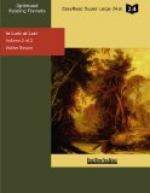To Lala Roy, the situation presented a problem with insufficient data, some of which would have to be guessed. A letter, now lost, said that a certain case contained papers necessary to obtain an unknown inheritance for Iris. How then to ascertain whether anybody was expecting or looking for a girl to claim an inheritance? Then there was half a coat-of-arms, and lastly there was a certain customer of unknown name, who had been acquainted with Iris’s father before his marriage. So far for Iris. As for the thief, Lala Roy had no doubt at all. It was, he was quite certain, the grandson, whose career he had watched for some years with interest and curiosity. Who else was there who would steal the papers? And who would help him, and give him access to the safe? He did not only suspect, he was certain that James was in some way cognizant of the deed. Why else did he turn so pale? Why did he rush off to Joe’s lodgings? Why did he sit trembling?
At half-past twelve Lala Roy rose.
“It is your dinner-hour,” he said to James, and it seemed to the unhappy man as it he was saying, “I know all.” “It is your dinner hour; go, eat, refresh the body. Whom should suspicion affright except the guilty?”
James put on his hat and sneaked—he felt that he was sneaking—out of the shop.
During his dinner-hour, Joseph himself called. It was an unusual thing to see him at any time; in fact, as he was never wont to call upon his grandfather, unless he was in a scrape and wanted money, no one ever made the poor young man welcome, or begged him to come more often.
But this morning, he walked upstairs and appeared so cheerful, so entirely free from any self-reproach for past sins, and so easy in his mind, without the least touch of the old hang-dog look, that Iris began to reproach herself for thinking badly of her cousin.
When he was told about the robbery, he expressed the greatest surprise that any one in the world could be so wicked as to rob an old man like his grandfather. Besides his abhorrence of crime in the abstract, he affirmed that the robbery of a safe was a species of villainy for which hanging was too mild—much too mild a punishment. He then asked his grandfather what were the contents of the packet stolen, and when he received no answer except a pleasant and a cheery laugh, he asked Iris, and learned to his sorrow that the contents were unknown, and could not, therefore, be identified even if they were found. This, he said, was a thousand pities, because, if they had been known, a reward might have been offered. For his own part he would advise the greatest caution. Nothing at all should be done at first; no step should be taken which might awaken suspicion; they should go on as if the papers were without value. As for that, they had no real proof that there was any robbery. Iris thought of telling him about the water-mark of the blank pages, but refrained. Perhaps there was no robbery after all—who




